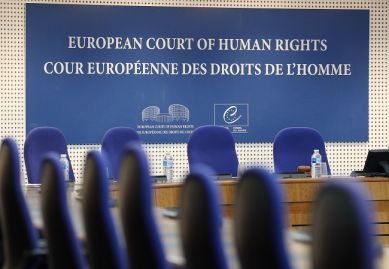Top European court rejects 3 faith bias complaints by UK Christians

The European Court of Human Rights on Tuesday ruled against three of four complaints by British Christians who were fired or sanctioned for wearing crosses in their workplace, or refused to provide services to homosexual couples due to their beliefs.
Their cases, which go back several years, were previously decided through British legal processes before being appealed to the ECHR. The court said Tuesday's rulings were not final. Any party may request that the case be taken up by the Grand Chamber of the Court.
Two cases involved employees who sought to wear Christian crosses attached to necklaces and were opposed by their employers.
In one case, the court ruled there had been a freedom of religion violation in 2006 involving British Airways clerk Nadia Eweida, who was suspended for wearing a cross. The employer had said it wished to project a certain corporate image.
"While this aim was undoubtedly legitimate, the domestic courts accorded it too much weight," the ECHR said.
British Airways changed its policy to accommodate religious symbols in 2007. The court awarded Eweida 2,000 euros in respect of non-pecuniary damage and 30,000 euros for costs and expenses.
In a similar case, nurse Shirley Chaplin had complained of her employer's restriction on wearing a crucifix. The employer said the cross could cause injury if a patient pulled on it or if it came into contact with an open wound. In November 2009 she was moved to a non-nursing temporary position which ceased to exist months later.
"[T]he reason for asking her to remove the cross, namely the protection of health and safety on a hospital ward, was inherently more important than that which applied in respect of Ms. Eweida and the hospital managers were well placed to make decisions about clinical safety," the court said.
The Most Rev. Dr. John Sentamu, Archbishop of York issued a statement following the rulings, stating that Christians and those of other faiths "should be free to wear the symbols of their own religion without discrimination."
Two other cases involved workers who refused to provide services to homosexual couples, citing their beliefs.
In the case of Lillian Ladele, the former registrar resigned in 2007 after being threatened with dismissal refusing to officiate civil partnership ceremonies between homosexual.
Relationship counselor Gary McFarlane was dismissed in 2008 by Relate counseling service for refusing to provided sex therapy to homosexual couples.
Ladele and McFarlane said they believed that homosexual relationships were against God's law and that it is incompatible with their beliefs to do anything to condone homosexuality.
Both complaints were rejected on appeal on the basis that their employers were not only entitled to require them to carry out their duties but also to refuse to accommodate views which contradicted their fundamental declared principles, and the requirements of the UK law.
Keith Porteous Wood, Executive Director of the National Secular Society in the UK, said Eweida gained a "limited victory" but found greater significance in the rejection of both cases involving people providing services to homosexual couples.
"In the cases of the registrar who refused to conduct civil partnerships and the counsellor who wouldn't counsel gay couples – the principle of non-discrimination against gay people has been upheld," he said. "If they had won these cases, it would have driven a coach and horses through the equality laws. The rights of gay people to fair and equal treatment would have been kicked back by decades"